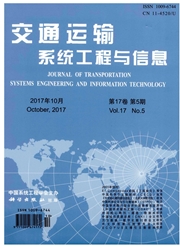

 中文摘要:
中文摘要:
为了发挥轨道交通票价的杠杆作用,进一步完善地面公交与轨道交通衔接,优化交通结构,增加客票收入,本文通过分析国内外大都市票制体系、票价优惠策略及北京市轨道交通发展状况,提出北京市轨道交通票价改革方案.在重点分析客流量、运营成本和城市人均收入水平的基础上,确定单一票价水平为4元;实施高低峰分时定价策略,通过分析三峰时间分布及高峰客流构成,用Logit模型计算出高低峰票价分别为6元、2元;提出制定月票的策略,以及其他一系列辅助票制来保障上班族、老人等的权益.该研究为实现北京市轨道交通可持续发展提供了理论基础.
 英文摘要:
英文摘要:
We present fare system reform policy for Beijing urban rail transit by the analysis of global metropolitan fare system, favorable strategies, and Beijing urban rail transit network development situation to fully leverage urban rail transit fare system, further improve the connection between land buses and urban rail transit, optimize traffic structure, and increase ticket revenue. The single fare level of 4 yuan is determined based on the analysis of passenger volume, operation cost, and urban per capita income level. Time-sharing pricing policy is proposed by the analysis of three peaks time distribution and peak time passenger flow construction. We derive on-peak and off-peak fares of 6 yuan and 2 yuan by Logit model. We also present monthly pass strategy and a series of other auxiliary fares to protect the benefits of the senior and commuter. The research provides a theoretical basis for sustainable development of Beijing urban rail transit.
 同期刊论文项目
同期刊论文项目
 同项目期刊论文
同项目期刊论文
 Analysis of the effect of the length of stop-spacing on the transport efficiency of a typically form
Analysis of the effect of the length of stop-spacing on the transport efficiency of a typically form Improve urban passenger transport management byrationally forecasting traffic congestion probability
Improve urban passenger transport management byrationally forecasting traffic congestion probability Rational formations of a metro train improve its efficiencies of both traction energy utilization an
Rational formations of a metro train improve its efficiencies of both traction energy utilization an Influence of inter-stop transport distances of a freight train upon its traction energy cost intensi
Influence of inter-stop transport distances of a freight train upon its traction energy cost intensi 期刊信息
期刊信息
